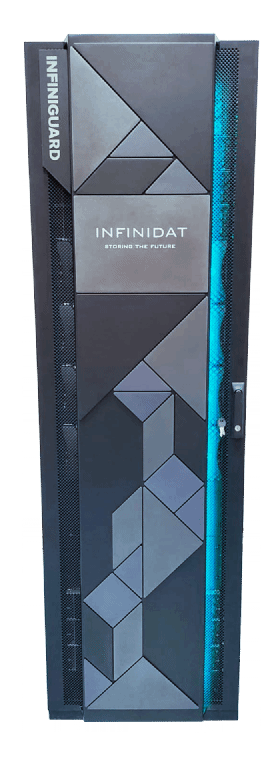
Getty Images
Infinidat adds cyber resilience software to InfiniGuard appliance
Infinidat upgraded its purpose-built backup appliance, InfiniGuard, with anti-ransomware software and boosted its DRAM to provide faster recovery times.
Infinidat today released a new version of InfiniGuard, its purpose-built backup appliance, and unveiled its InfiniSafe software, which includes new data protection and anti-ransomware features for the appliance.
The new cyber resilience software adds immutable snapshots, logical air-gapping and an isolated network where data can be scanned for malware. InfiniGuard was also updated with the vendor's primary storage array, InifiniBox, as its back-end storage, with faster data deduplication engines to bolster its data backup offering.
"What this announcement really does is start to take cyber resilience and build it into the primary storage," said Phil Goodwin, an analyst at IDC, who noted that cybersecurity has become a top concern for IT and business leaders.
Cyber resilience to keep data safe
InfiniSafe software brings a series of native data protection and anti-ransomware features to InfiniGuard, according to Eric Herzog, CMO at Infinidat.
They start with immutable snapshots, in which data is written once and can't be altered or deleted. Snapshots happen on the back-end storage without affecting primary array performance or interrupting backup software processes.

"There is no impact of doing cyber resilience on your backup capability on the purpose-built appliance because it's done on the back-end storage," Herzog said.
After the snapshots are taken, the InfiniSafe software creates a logical air gap, removing access to the snapshots from the host, making it difficult for hackers to access, Herzog said. The snapshots then are placed in the fenced forensic network, an isolated testing environment where they can be scanned for malware.
The isolated network can help find not only what data has been infected but when, according to Goodwin. A useful feature, given that ransomware can take months to detonate, which increases the chance for infected backups or snapshots to be used in restorations.
"It can also provide that safe area where you've separated yourself from the networks and from the environment so that you can work without risk of additional infection," Goodwin said.
InfiniSafe offers baseline native backup features, according to Johnny Yu, an analyst at IDC.
"[Infinidat is] covering a lot of ground on the ransomware protection side of things natively into their platform," he said.
Customers using InifiniGuard would likely need to rely less on third-party backup software providers. However, Yu cautioned, even with the new data protection features, Infinidat customers cannot rely wholly on InfiniGuard and should continue to turn to third-party providers to create a comprehensive anti-ransomware program.
For example, the isolated network enables data to be scanned for malware, but Infinidat does not provide the tools to do so, he said.
"There are specifically built third-party software products that have a way to do a clean recovery or identify clean copy," Yu said. "But [here] it does seem to be limited to just third-party vendors."
InfiniSafe can be certified compatible with any of the supported backup software packages from Veeam, Commvault, IBM Spectrum Protect, Veritas and others, according to Herzog.
Faster restoration with a new InfiniBox
Infinidat is using its flagship primary storage array, InfiniBox, as its back-end storage for InfiniGuard, bringing higher performance than previous versions, according to Herzog. Data comes in through the array's deduplication engines, which have been upgraded, and is stored on InfiniBox. The vendor is using more DRAM and upgraded software to better take advantage of these improvements.
Herzog said the new version of InfiniGuard can back up data at up to 180 TB an hour, more than double the previous model's 74 TB per hour. This will also speed up remote replication, where data is copied to another site as part of its disaster recovery plan. Herzog noted that data reduction and backup speed can vary depending on the data set.
While fast backups are important, IDC's Goodwin said restore and recovery speeds are key.
"Restoring is critical because users can't conduct business [without being recovered], customers can't get access, and manufacturing or operational systems are shut down," he said.
Herzog said the hardware upgrades and the new cyber resilience InfiniSafe software ensures InfiniGuard can restore up to one-half to 1 petabyte in about 30 minutes.
InfiniGuard competes with other purpose-built backup appliances such as Dell EMC Data Domain, HPE StoreOnce and ExaGrid.






